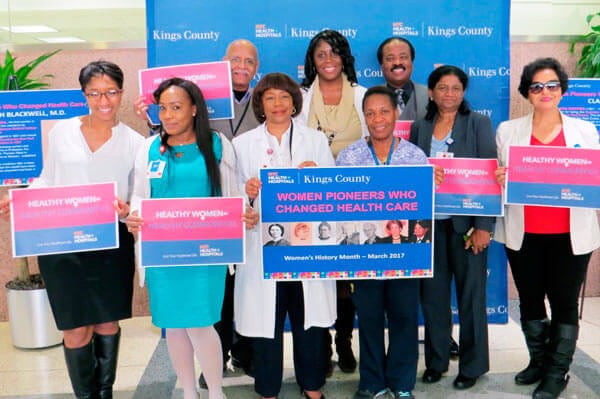Health care workers and administrators at Kings County hospital are honoring women’s history month with a blast from the past. On March 8 the hospital celebrated International Women’s Day with the launch of a new exhibit celebrating the history of women in health care.
The exhibit “Women Pioneers Who Changed Health Care,” is on display until the end of the month and spotlights women who revolutionized the medical field, such as Clara Barton and Susan Smith McKinney, who both also have Brooklyn schools named after them, said one doctor.
“Each of those women has a unique aspect to how they contributed to health care overall,” said doctor Wendy Wilcox, the chief of the hospital’s obstetrics department. “Some of them have very recognizable names and some maybe not, but they’re all really important for the public to know that women have made significant contribution to health and medical care in United States, and especially women of color.”
The diverse list of women include medical firsts to women created popular health care methods. Other women included in the exhibit are women who became the firsts in the medical industry, such as Regina Benjamin, Elizabeth Blackwell, Rebecca Lee Crumpler, Susan Smith McKinney-Steward, Virginia Apgar and Antonia Novello.
Doctor Wilcox is proud of the recognition towards these women and says that as guests walk into the lobby of the hospital’s D building to see the display, she wants them to feel overjoyed.
“I would like people to feel the same sense of pride like I do, and to know that women, especially women of color, played a historical part and a very significant impact on the medical industry,” she said. “I want young people, eseciailly young women of color to know that they can certainly inspire to be doctors and to know that if they could do it, you can.”
In addition to the exhibit, the hospital recently launched a women’s health campaign, titled “Healthy Women Healthy Communities,” initiative to help encourage women to emphasize the importance of their health in their communities.
“So women actually pretty much determine the health of the families, so if you make sure that women of the family or matriarch is getting health care then the rest of family gets it as well, men don’t go for checkups, women are more likely to go and are more likely to bring kids and partner for care, and try to target women in family and give them access.”
























